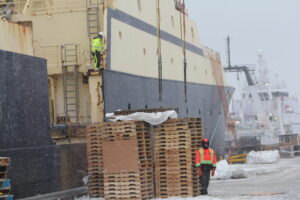Aleutians East Borough opposes Rep. Peltola’s proposed trawling limitations

The factory trawler Alaska Ocean seen in Dutch Harbor during A Season 2023.
Communities in the Aleutians are pushing back against proposed legislation that would bring stricter regulations to the Bering Sea trawl fishery.
The City of Unalaska and the Aleutians East Borough are among 53 organizations that signed onto a letter sent to U.S. Rep. Mary Peltola last week, urging her to withdraw H.R. 8507, a bill she sponsored in May.
The proposed legislation aims to add new regulations to where trawling can take place across the United States, not only in Alaska.
Trade organizations and some coastal communities whose economies rely on trawl fisheries have pushed back against the bill, asking the congresswoman to repeal it.
“If enacted, H.R. 8507 would directly harm fishermen and coastal communities in Alaska and throughout our nation, along with countless other people who rely on a healthy domestic seafood sector for food, jobs, and their way of life,” the letter said.
Alaska’s fishing industry has experienced major turmoil in recent years. The collapse of some fish stocks, like Bristol Bay red king crab, the decrease of salmon prices in world markets, and a flood of foreign fish have led to something of a crisis in Alaska’s commercial fisheries.
The Aleutians East Borough, which consists of six communities on the Alaska Peninsula and Aleutian Chain, has been hard hit by fluctuations in the industry. Low salmon prices last year and the closure of Peter Pan Seafood Co., which operated in the borough, have led community leaders to sound the alarm.
“Our major source of revenue is from raw fish taxes on seafood products, the majority of which comes from Alaska trawl fisheries,” said Aleutians East Borough Mayor Alvin D. Osterback. “These revenues fund our schools, community services, and our infrastructure.”
“If our trawl fisheries were to be substantially harmed by the requirements of this legislation … then it all comes to an end for us out here,” he added.
Bycatch has been a hot-button issue in Alaska’s fisheries, and Peltola promised to limit the accidental catch of non-targeted fish during her campaign. Dismal salmon returns in Western Alaska have created an existential threat to the region’s subsistence culture, and brought increased political pressure to limit bycatch in the Bering Sea, which some say is exacerbating the problem.
“Predatory industrial and foreign trawlers, ineffective management systems, a changing climate, and more have all played their own role,” Peltola said in a statement on her website.
But the letter’s authors point to research from the National Oceanic and Atmospheric Administration Fisheries Science Centers, which suggests climate change, not bycatch, is the reason salmon numbers have fallen so drastically.
“This science shows climate-related shifts in our nation’s marine ecosystems, including significant changes in the distribution of fish populations and other marine life,” the letter says.
The authors continue to say that Peltola’s proposed legislation would hinder regulators’ ability to effectively manage fisheries, calling the bill’s methods “archaic and counterproductive.”
Alaska’s seafood industry is the economy’s second largest sector, falling behind only oil and gas.
Stephanie Madsen, executive director of the seafood trade organization At-Sea Processors Association, said the legislation would hurt seafood workers, one of the largest working groups in the state.
“This bill threatens seafood sector jobs in Alaska and across the United States. More than 1.5 million Americans have jobs that depend on commercial seafood, and they deserve better than the politicization of fisheries science and management,” she said.
The summer season for Alaska’s largest trawl fishery, Alaska Pollock, opened June 10 and can last as long as Nov. 1.
